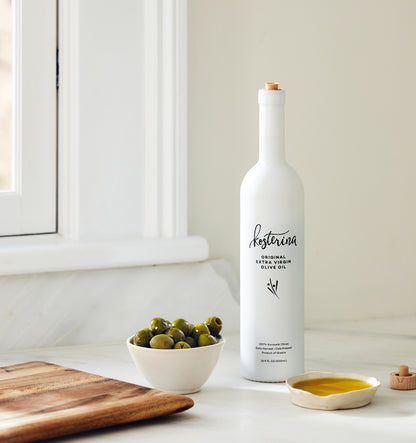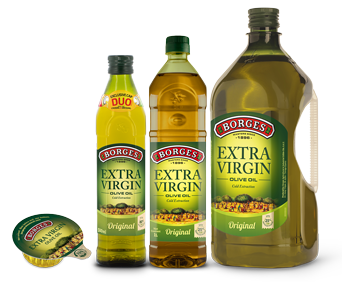Surprising Extra Virgin Olive Oil Benefits You Need to Know
Surprising Extra Virgin Olive Oil Benefits You Need to Know
Blog Article
Checking Out the Various Kinds Of Olive Oil and Their Usages, Including Additional Virgin Olive Oil
The exploration of olive oil includes a diverse range of kinds, each offering distinct flavors and culinary applications. Bonus virgin olive oil, renowned for its remarkable quality and health benefits, serves as a staple in many kitchens, yet it is only one element of this complex component.
What Is Olive Oil?
Stemmed from the fruit of the olive tree, olive oil is a staple in Mediterranean food and a crucial active ingredient in numerous culinary applications. This versatile oil is produced by pressing entire olives, resulting in a fluid that varies in shade, aroma, and flavor depending on the kind of olives used, the area of growing, and the removal process. Olive oil is mainly made up of monounsaturated fats, specifically oleic acid, which is known for its prospective health and wellness advantages, including anti-inflammatory homes and cardiovascular assistance.
Along with its cooking usages, olive oil has a lengthy background of application in traditional medication and skincare, owing to its rich antioxidant content (extra virgin olive oil benefits). The oil is frequently utilized in dressings, sauces, and for cooking approaches such as sautéing and roasting. Its unique taste account can enhance the taste of numerous meals, making it an essential active ingredient for both home cooks and professional chefs
Furthermore, olive oil is commemorated for its function in the Mediterranean diet, which is related to numerous health advantages. As awareness of these benefits grows, olive oil remains to acquire popularity worldwide as a basic part of a healthy and balanced lifestyle.
Sorts Of Olive Oil
Understanding the various kinds of olive oil is crucial for both health-conscious consumers and culinary enthusiasts. Olive oil is classified primarily based upon its removal method and top quality, which substantially affects its fragrance, taste, and health benefits.

Light olive oil, despite its name, refers to a lighter flavor and not lower calories. It is perfect for those looking for a much more refined preference in dressings and marinades. Furthermore, there are flavorful olive oils infused with natural herbs, flavors, or citrus, which can boost meals without the requirement for added spices.
Each sort of olive oil offers specific cooking functions, and understanding these differences allows customers to make enlightened options that line up with their food preparation designs and health and wellness objectives.
Bonus Virgin Olive Oil
Extra virgin olive oil (EVOO) is extensively pertained to as the best olive oil available, popular for its rich flavor and numerous wellness advantages. To be categorized as additional virgin, the oil needs to be created from fresh olives utilizing mechanical procedures, without the use of solvents or excessive heat. This meticulous technique protects the oil's all-natural flavors, antioxidants, and healthy and balanced fats, leading to an item with a low acidity level of less than 0.8%.
EVOO is bountiful in monounsaturated fats, particularly oleic acid, which is connected to minimized inflammation and boosted heart wellness. It additionally contains polyphenols, effective anti-oxidants that might supply protective results against persistent illness. The taste profile of EVOO can vary dramatically depending on the olive selection and area of manufacturing, ranging from fruity and grassy to robust and peppery.

Culinary Use Olive Oil

In cooking, olive oil can be utilized for sautéing, roasting, and barbecuing, providing a much healthier option to butter or other fats. Its high smoke point makes it suitable for various cooking techniques, while its anti-oxidants add to a heart-healthy diet plan. Drizzling olive oil over completed dishes, such as pasta, fish, or smoked veggies, can raise flavors and add a touch of sophistication.
Furthermore, olive oil plays a significant duty in baking, where it can change standard fats in recipes for bread and breads, presenting dampness and a refined taste. It likewise acts as a base for instilled oils, allowing chefs to trying out flavors such as garlic, natural herbs, or chili, even more broadening its culinary capacity. On the whole, olive oil's flexibility makes it vital in her latest blog both home and expert kitchens.
Finding Quality Olive Oil
When choosing high quality olive oil, it's essential to take into consideration numerous key aspects that affect the product's scent, health and wellness, and flavor benefits. Choose for additional virgin olive oil (EVOO), which is obtained from the first cold pressing of olives and contains the greatest degrees of anti-oxidants and useful compounds. Look for oils that are licensed by identified companies, as this commonly guarantees adherence to rigorous quality standards.
The packaging likewise plays a substantial role in maintaining the oil's stability. Choose oils kept in dark glass bottles or tins to shield against light degradation. Pay interest to the harvest date; fresher oils use superior taste and dietary worth, so pick items that are within 18 months of their harvest.
Furthermore, take into consideration the origin of the oil. Premium olive oils frequently originate from particular areas known for their distinctive flavor accounts, such as Italian, Spanish, or Greek oils. Be mindful of the preference; an excellent quality olive oil should have a balance of fruity, bitter, and peppery notes, suggesting its splendor and intricacy. By assessing these elements, you can guarantee you are choosing the very best olive oil for your culinary demands.
Conclusion
In summary, the exploration of various types of olive oil exposes distinctive attributes and applications, with added virgin olive oil standing for the peak of quality due to its low level of acidity and high antioxidant content. Comprehending the different varieties of olive oil permits websites for notified options in food preparation techniques, promoting healthier techniques while improving the total gastronomic experience.
Obtained from the fruit of the olive tree, olive oil is a staple in Mediterranean food and an essential active ingredient in different cooking applications.The most typical kinds of olive oil consist of refined olive oil, pure olive oil, and light olive oil.Extra virgin olive oil (EVOO) is widely concerned as the greatest quality olive oil readily available, celebrated for its abundant flavor and various wellness benefits. Decide for extra virgin olive oil (EVOO), which is derived from the initial cold pressing of olives and has the greatest levels of antioxidants and valuable substances.In recap, the exploration of numerous kinds of olive oil discloses unique qualities and applications, with extra virgin olive oil representing the peak of top quality due to its low level of acidity and high antioxidant web content.
Report this page